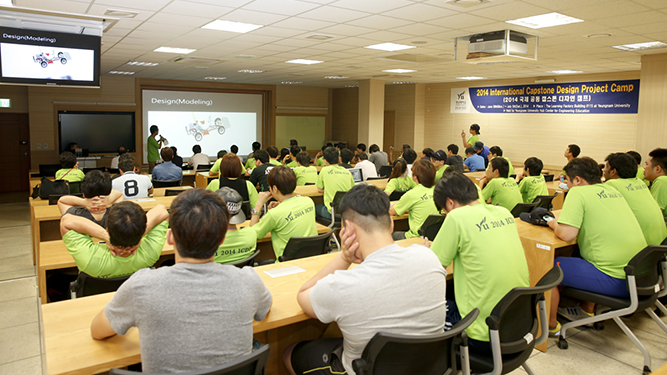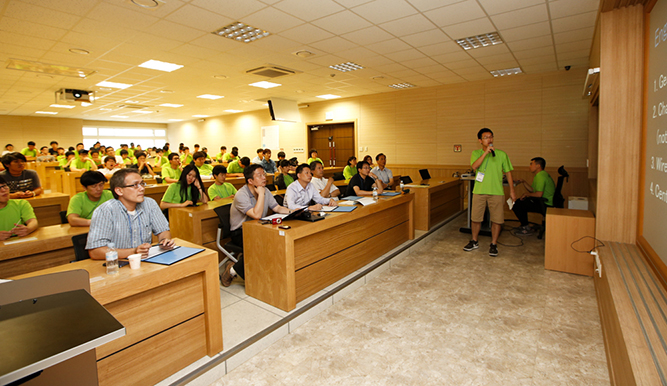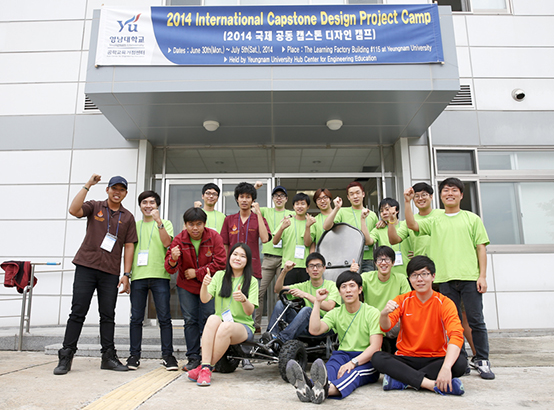'The 2nd International Capstone Design Camp' was held for 5 days at YU, hosted by the YU Engineering Education Hub Center. 96 students from Korea, India, Thai, China and Japan gathered to make an electromobile by themselves.
[July 4, 2014]
College students from the five countries of Korea, India, Japan, China and Thailand gathered to produce an electric vehicle.
YU (President Noh Seok-kyun) hosted the 'International Capstone Design Camp' for five days from June 30. 'Capstone Design', which represents 'creative total design', aims at fostering engineers with field work capacities and creativity. Based on the knowledge that students acquired in their field, students are given the opportunity to design, produce and assess products needed in local industries in this engineering education program that trains creativity, work capacities, teamwork, and leadership.

This was organized by the YU Engineering Education Hub Center (Director Song Dong-joo) and co-hosted by 11 university engineering education innovation centers such as YU, Gangneung-Wonju National University, Kyungil University, Keimyung University, Kunsan National University, Kumon National University of Technology, Daegu University, Andong National University, Changwon National University, Korea National University of Transportation, and Halla University. This contest, which was sponsored by the Ministry of Education, Korea Institute for Advancement of Technology, and a local electronics parts manufacturer, Heesung Electronics, is the second since 2013. Six foreign universities such as Bangalore Institute of Technology and Maharashtra Institute of Technology from India, Shibaura Institute of Technology and Kanazawa Institute of Technology from Japan, South China University of Technology from China, and Rajamangala University of Technology Thanyaburi from Thailand, and 19 domestic universities participated for a total of 25 universities from various countries and a total of 92 students.
The goal of this camp was to design and produce electric vehicles to compete in the '2014 BAJA SAE Korea'. In order to perfect their works during the short camp, participating students made teams of about 15 students from different majors and colleges around the world for about a month beforehand. Team members shared opinions and set their concept before participating in the camp through e-mails and SNS. On the first day of camp, they presented the design concepts of each team to kick off the camp. Participants then received teaching from professors and master's and PhDs in the electric automobile field, to revise and supplement their works and complete their final work.
Kim Yong-rae (26, Gangneung-Wonju University, senior in electronic engineering), the team leader of TYRANOS made up of students from a total of 14 universities including South China University of Technology from China, Rajamangala University of Technology Thanyaburi from Thailand, Shibaura Institute of Technology and Kanazawa Institute of Technology from Japan, and Bangalore Institute of Technology and Maharashtra Institute of Technology from India, as well as Kyungpook National University and Gangwon National University, said, "At first I was skeptical whether it would be possible to cooperate with students who studied in different places to make an electric automobile," and added, "But during the camp, we shared opinions and knowledge with each other to create synergy effects. When the final results were made, I was really surprised. Above all else, it was a good experience because we were able to use what we learned in class and actually apply them by making an electric vehicle."

During the camp, participating students attended lectures from 9 a.m. every morning, followed by workshops. They also made the actual electric vehicles including frame cutting, processing and welding, working way past midnight. On the 4th, the last day of the camp, they took their electric vehicle and participated at the Baja SAE in car parades, and took dynamic tests such as acceleration, max speed, towing power, and rock climbing to test the performance of the electric vehicles they built.
Lin Xiao Zhou (24), a junior in automobile mechanical engineering at the South China University of Technology, said, "I have always been interested in the Chinese automobile industry. While China produces many cars, it is true that our automobile technologies fall behind that of advanced automobile builders such as Korea," and added, "Through this camp, I was able to experience the education course and intellectual level on vehicles among Korean students, and it made me realize why Korea's automobile industry is at a world-class level. I will study even harder and hope to make China into a powerhouse in the automobile industry."
YU Engineering Education Innovation Center director Song Dong-joo (60, School of Mechanical Engineering) who supervised this camp said, "By having students from different countries majoring in different fields such as mechanics, electric, electronics, and computers create one team and carrying out a complex project of making electric vehicles, it will be an opportunity to not only develop engineering design and creative problem-solving skills, but also to further enhance international teamwork and communication," and added "We are planning to develop this into a success model of international cooperation engineering education carried out in Korea."




 This was organized by the YU Engineering Education Hub Center (Director Song Dong-joo) and co-hosted by 11 university engineering education innovation centers such as YU, Gangneung-Wonju National University, Kyungil University, Keimyung University, Kunsan National University, Kumon National University of Technology, Daegu University, Andong National University, Changwon National University, Korea National University of Transportation, and Halla University. This contest, which was sponsored by the Ministry of Education, Korea Institute for Advancement of Technology, and a local electronics parts manufacturer, Heesung Electronics, is the second since 2013. Six foreign universities such as Bangalore Institute of Technology and Maharashtra Institute of Technology from India, Shibaura Institute of Technology and Kanazawa Institute of Technology from Japan, South China University of Technology from China, and Rajamangala University of Technology Thanyaburi from Thailand, and 19 domestic universities participated for a total of 25 universities from various countries and a total of 92 students.
This was organized by the YU Engineering Education Hub Center (Director Song Dong-joo) and co-hosted by 11 university engineering education innovation centers such as YU, Gangneung-Wonju National University, Kyungil University, Keimyung University, Kunsan National University, Kumon National University of Technology, Daegu University, Andong National University, Changwon National University, Korea National University of Transportation, and Halla University. This contest, which was sponsored by the Ministry of Education, Korea Institute for Advancement of Technology, and a local electronics parts manufacturer, Heesung Electronics, is the second since 2013. Six foreign universities such as Bangalore Institute of Technology and Maharashtra Institute of Technology from India, Shibaura Institute of Technology and Kanazawa Institute of Technology from Japan, South China University of Technology from China, and Rajamangala University of Technology Thanyaburi from Thailand, and 19 domestic universities participated for a total of 25 universities from various countries and a total of 92 students.






